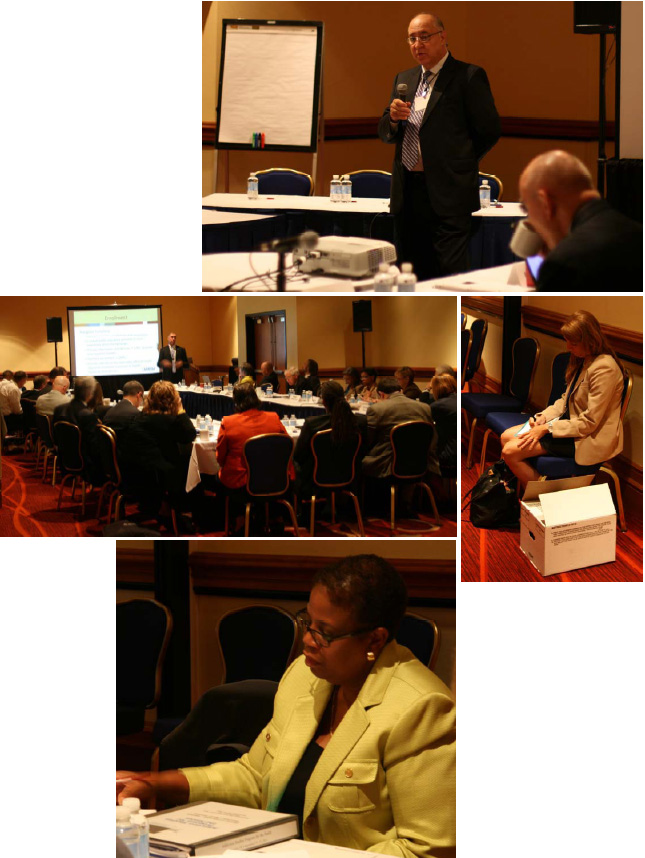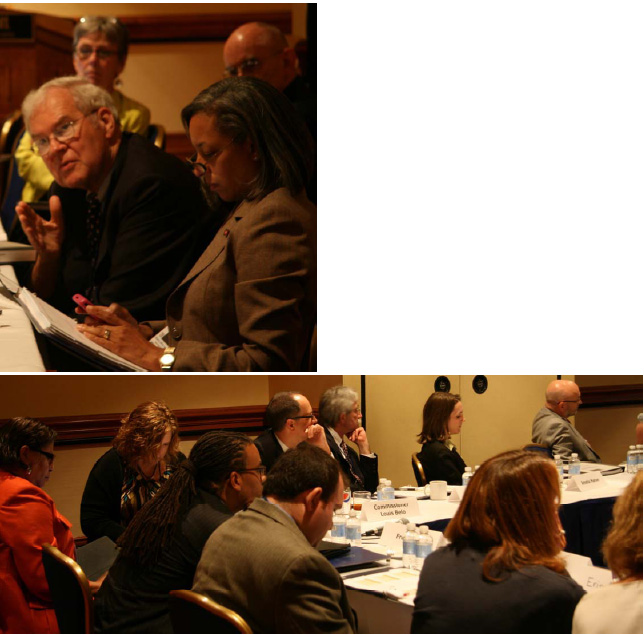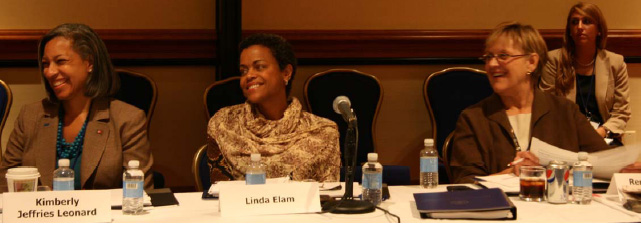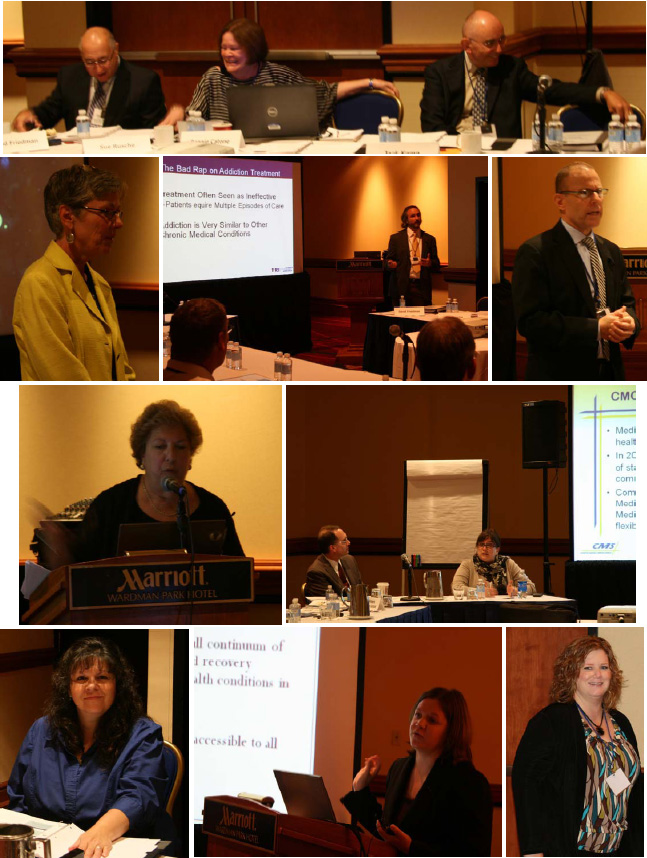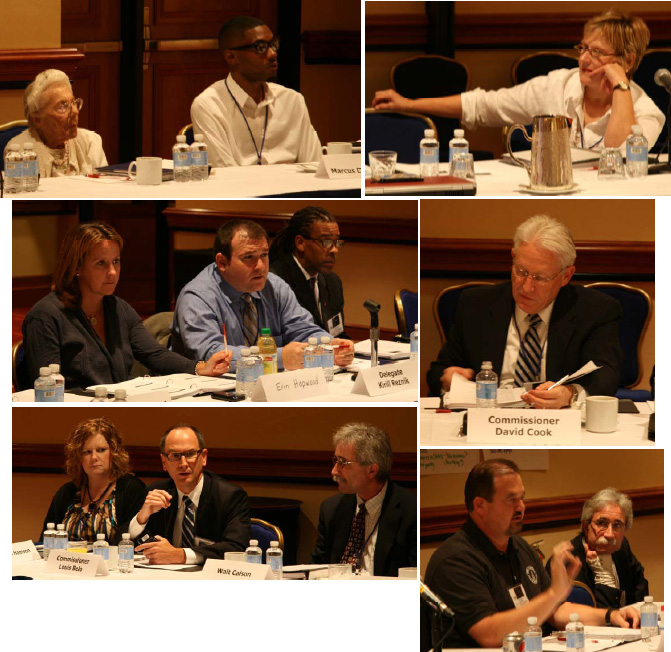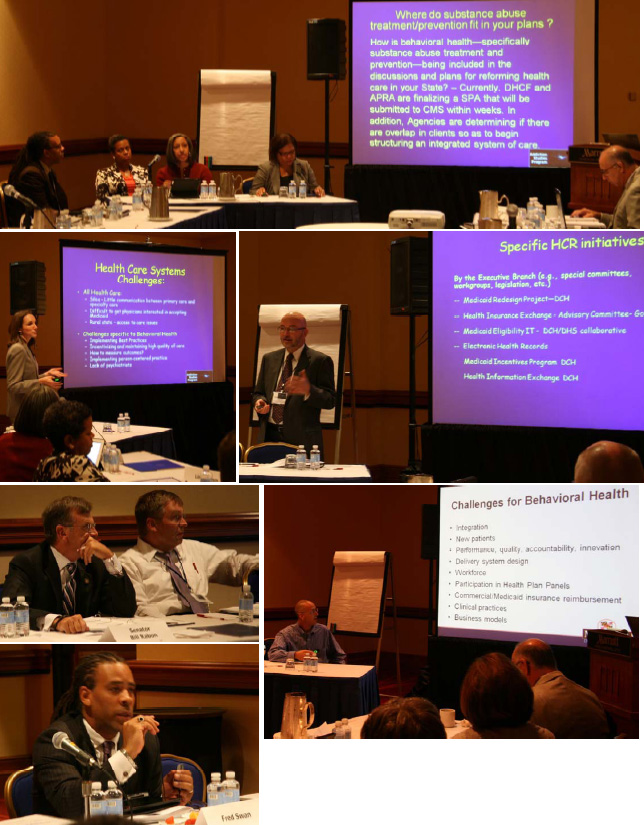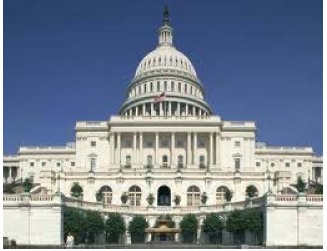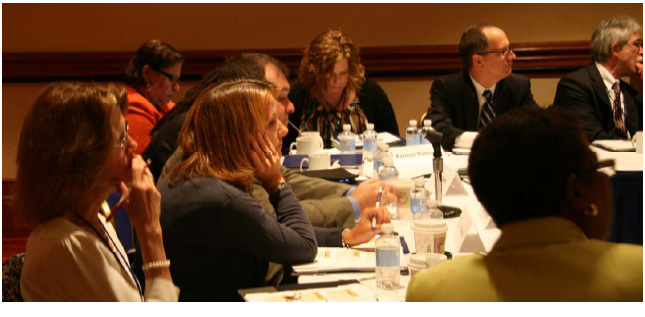District of Columbia Team
Yvette M. Alexander
Councilmember
District of Columbia
Member, Health, Aging, and Community Affairs
Chair, Public Services and Consumer Affairs
Washington, DC
Deborah Carroll, Esq.
Administrator
Income Maintenance Administration
Department of Human Services
Washington, DC
Linda Elam, PhD, MPH
Deputy Director
Medicaid
Department of Health Care Finance
Washington, DC
Kimberly Jeffries Leonard, PhD
Senior Deputy Director
Addiction Prevention and Recovery Administration
Department of Health
Washington, DC
Fred Swan
Administrator
Family Services Administration
Department of Human Services
Washington, DC
|
|
Georgia Team
David Cook
Commissioner
Department of Community Health
Atlanta, Georgia
Representative Sharon Cooper
Chair, Health and Human Services
Member, Judiciary – Non Civil, Regulated Industries and
Rules
Georgia House of Representatives
Marietta, Georgia
Senator Judson Hill
Member, Health and Human Services
Member, Insurance and Labor
Georgia Senate
Marietta, Georgia
Representative Jay Neal
Chair, State Institutions and Property
Member, Public Safety and Homeland Security
Georgia House of Representatives
Atlanta, Georgia
Frank Shelp
Commissioner
Department of Behavioral Health
and Developmental Disabilities
Office of Human Resources
Atlanta, Georgia
Senator Renee Unterman
Chair, Health and Human Services Committee
Member, Appropriations
Georgia Senate
Buford, Georgia
|
Maryland Team
Tom Carguilo, Dr.
Director
Alcohol and Drug Abuse Administration
Department of Health and Mental Hygiene
Catonsville, Maryland
Renata J. Henry
Deputy Secretary
Behavioral Health and Disabilities
Department of Health and Mental Hygiene
Baltimore, Maryland
Carolyn Quattrocki
Executive Director,
Health Care Reform
Office of the Governor
Annapolis, Maryland
Delegate Kirill Reznik
Maryland House of Delegates
Annapolis, Maryland
|
|
North Carolina Team
Louis Belo
Chief Deputy Commissioner
Department of Insurance
Raleigh, North Carolina
Walt Caison, PhD
Team Leader
Best Practice & Community Innovations
Division of Mental Health, Developmental Disabilities and
Substance Abuse
Department of Health and Human Services
Raleigh, North Carolina
Amelia Mahan, DMA
Clinical Social Worker
Division of Medical Assistance
Department of Health and Human Services
Raleigh, North Carolina
Senator Louis Pate
Co-Chair, Health Care
Chair, Appropriations Health and Human Services
Member, Judiciary I (Civil)
North Carolina Senate
Raleigh, North Carolina
Senator Bill Rabon
Member, Health Care Committee and
Health and Human Services Appropriations Committee
North Carolina Senate
Raleigh, North Carolina
|
|
Welcome and introductions
Great job providing insight in what we can look forward
to this week.
Keynote: SAMHSA’s View of a Good Treatment
System—John O’Brien
John is an excellent speaker. Good information covered.
It’s a tough topic in a tough time.
Current Perspectives on Substance Abuse in the
U.S.—Jack Stein
P—Well presented. Good summery of day and issues.
The Biology of Addiction and Public Policy—David
Friedman
Fantastic presentation of important info across many
areas in a clear understandable way. Best of the day.
Treating the Chronic Disease of Addiction—Adam
Brooks
Did a really good job—to the point, and on track—good
presentation!
Treatment Panel: System Design and Funding for
a Chronic Health Problem—Jack Kemp
Relevant to many current initiatives in Georgia. Excellent.
Treatment Panel: Integrating Substance Abuse
Treatment and Primary Health Care—Mady Chalk
Feel like she has a great deal of knowledge, but not
much time to share.
Thursday’s Facilitated Session: Implications of
Today’s Presentations for State Leaders—Bruce
Feustel, Facilitator
Good interaction—got a mix of ideas, but each state is
so different in their levels of implementation that it was
difficult to focus on similarities and substance use vs.
the pros and cons of reform.
Where we are now and where we are hoping to
go—State Panels
Good to know other states transformation.
Field Panel: Issues before Congress—Gabrielle
de la Gueronniere
I look forward to reading the recommendations document.
Field Panel: Treatment Providers—Becky
Vaughn
One of the best presentations I have seen relating to
treatment providers. Very insightful and motivational.
Field Panel: The Recovery Community—Pat Taylor
Very exciting stuff!
Luncheon Speaker: A Personal View of Addiction—
Peter Gaumond
Important in keeping work personal. Reinforced power
of genetics and familial relationships.
Prevention Panel: The Science of Effective Prevention—
Sue Rusche
Good, but too little time—feel like we all had lots of
questions about programs available—needed more specifics.
Federal Panel: Centers for Medicare and Medicaid
Services—Melissa Harris
Good presenter—especially I think to those in the government
arena having to administer the Medicaid programs.
I’m sure they might have liked more time.
Federal Panel: Health Resources and Services
Administration—Alex Ross
How could this section be improved?
Short and sweet—a resource, positive attitude and admitted
he didn’t have all the answers—which was refreshing.
Friday’s Facilitated Session: Implications of Today’s
Presentations for State Leaders—Bruce
Feustel, Facilitator
Very good and kept us focused.
|
|
Charge to State Teams—Jack Kemp
Excellent idea and opportunity to take action.
Facilitated Team Meetings
Great job assisting and focusing us.
Summary of D.C.’s Six-Month Plan
Very good. Seemed well informed and understands concerns.
Summary of Georgia’s Six-Month Plan
Change culture within Legislature. Educate legislators with
Addiction Studies and Criminal Justice reform. Tie prevention
to First Lady’s early educative initiative.
Summary of Maryland’s Six-Month Plan
Integration goals already on track. Challenges to these
goals may be spoken to more specifically.
Summary of North Carolina’s Six-Month Plan
Talked a lot about effective prevention programs. Revisit
survey of services. More communication and expert help for
legislators. Recovery system of care. Work with TRI.
To what extent did the program help you meet your
overall expectations?
• One of the best addiction-related programs I have ever
attended. Covered all phases of addiction in a very succinct
way.
• Highlighted areas of best practices not previously considered
in the state. Improved understanding of challenges
states are experiencing with health care reform.
• This was a huge opportunity for Georgia with a very specific
result that would not have happened without this
unique meeting at this particular time.
To what extent will the program help your state develop
priorities and execute results-oriented response
to public-policy issues surrounding addiction?
• This has connected us with some extra resources at just
the right time.
• Bringing the players together as this meeting did is the
first step to better coordination and working together. Informal
and formal discussions were terrific.
• Important to understand underlying science.
In the next six months, do you plan to visit the Addiction
Studies Program website?
• Plan to use as a resource to continue developing my understanding
and, more specifically, as a resource to enhance
my ability to influence my colleagues.
• Definitely, and will have several members of my department
access it as well.
• won’t wait six months—six days is more likely. 1-Concise
bullet points. 2-Reference to specific people and other sites
for information. 3-A “how to” section.
To what extent did material presented in the program
change the way you view the nature of addiction?
Scale: 1-A great deal, 4-To some extent, 7-Not at all.
• Very well done. Much more aware of the issue.
• Great review of material on addiction.
• I agree that addiction is a chronic condition. This program
helped me by providing more scientific and evidence-based
data to support this argument.
How would you rate the overall quality of the program?
• Excellent program. Very well done. Thank you all very
much.
• Far exceeded my expectations. I was greatly impressed
by the quality presentations.
• Great speakers. I am staff to several legislative committees
and will be contacting some of the presenters for assistance
in possibly briefing those committees.
What aspects of the program did you like most?
• Science and best practices of addiction, and treatment,
recovery models.
• The information on the biology of addiction.
• The opportunity to meet the group and gain valuable
knowledge from so many experts in the field.
• Being with key legislators from my state.
|
Sponsoring Faculty
Wake Forest School of Medicine
David Friedman, PhD
Director, Addiction Studies Program
Professor, Wake Forest School of Medicine
Department of Physiology and Pharmacology
Winston-Salem, North Carolina
National Families in Action
Sue Rusche
Co-Director
Addiction Studies Program
President and CEO
National Families in Action
Atlanta, Georgia
Treatment Research Institute
Bonnie Catone
Partner, Addiction Studies Program
Director of Communications
Treatment Research Institute
Philadelphia, Pennsylvania
Jack Kemp, MS
Partner, Addiction Studies Program
Senior Policy Associate
Treatment Research Institute
Philadelphia, Pennsylvania
National Conference of State Legislatures
Karmen Hanson
Partner, Addiction Studies Program
Program Manager, Health Program
National Conference of State Legislatures
Washington DC
Staff
Eric Dickerson
Controller and Office Manager
National Families in Action
Atlanta, Georgia
Alise Garcia
Senior Staff Assistant
Health Program
Denver, Colorado
Diane Joyner
Administrative Assistant
Wake Forest University School of Medicine
Department of Physiology and Pharmacology
Winston-Salem, North Carolina
Joanne Stroud
Research Analyst II
Health Program
National Conference of State Legislatures
Denver, Colorado
Marcus D. Peterson
Research Analyst
Forum for State Health Policy Leadership
National Conference of State Legislatures
Washington, DC
| |
Additional Faculty
Adam Brooks
Senior Scientist
Treatment Research Institute
Philadelphia, Pennsylvania
Mady Chalk
Senior Scientist
Treatment Research Institute
Philadelphia, Pennsylvania
Bruce Feustel
Senior Fellow
Legislative Management Program
National Conference of State Legislatures
Denver, Colorado
Peter Gaumond
Chief, Recovery Branch
Office of National Drug Control Policy
Executive Office of the President
Washington, DC
Gabrielle de la Gueronniere
Director for National Policy
Legal Action Center
Washington, DC
Melissa Harris
Acting Deputy Director
Division of Benefits and Coverage
Disabled and Elderly Health Program Group
Centers for Medicare and Medicaid Services
Baltimore, Maryland
John O’Brien
Senior Advisor to the
Administrator for Behavioral Health Finance
Substance Abuse and Mental Health
Services Administration
Rockville, Maryland
Alexander F. Ross, ScD
Office of Special Health Affairs
Health Resources and Services Administration
Department of Health and Human Services
Rockville, Maryland
Jack B. Stein, PhD
Senior Advisor
Office of Demand Reduction
Office of National Drug Control Policy
Executive Office of the President
Washington, DC
Patricia Taylor
Executive Director
Faces and Voices of Recovery
Washington, DC
Becky Vaughn
Chief Executive Officer
State Associations of Addiction Services
Washington, DC
Fred Volpe
Project Officer, Drug Free Communities
Center for Substance Abuse Prevention
Substance Abuse and Mental Health
Services Administration
Rockville, Maryland
|
Thursday, September 15, 2011
|
8:00 a.m.
8:30 a.m.
9:00 a.m.
10:00 a.m.
10:15 a.m.
11:15 a.m.
12:15 p.m.
1:30 p.m.
2:30 p.m.
3:30 p.m.
3:45 p.m.
4:30 p.m.
|
|
Continental Breakfast
Opening Session
Welcome, David Friedman
Introduction to Your Books, Sue Rusche
Substance Use and Health Reform: Goals for This Workshop, Jack Kemp
Introductions, Bonnie Catone
Keynote: SAMHSA’s View of a Good and Modern Treatment System and Health Reform, John O’Brien
Break
Current Perspectives on Substance Abuse in the U.S., Jack Stein
The Biology of Addiction and Public Policy, David Friedman
Lunch
Treating the Chronic Disease of Addiction, Adam Brooks
Treatment Panel
System Design and Funding for a Chronic Health Care Problem, Jack Kemp
Integrating Substance Abuse Treatment and Primary Health Care, Mady Chalk
Break
Facilitated Discussion: Implications of Today’s Presentations for State Leaders
Evaluation Forms and Adjourn
Dinner on Your Own
|
Friday, September 16, 2011
|
8:30 a.m.
9:00 a.m.
10:15 a.m.
10:45 a.m.
12:00 p.m.
1:30 p.m.
2:30 p.m.
3:30 p.m.
3:45 p.m.
4:30 p.m.
|
|
Continental Breakfast
State Panel: Where Are We Now and Where We Are Hoping to Go
District of Columbia, Georgia, Maryland, and North Carolina
Break
Voices from the Field:
1. Issue before Congress, Gabrielle de la Gueronniere
2. Treatment PRoviders, Becky Vaughn
3. The Recovery Community, Pat Taylor
Lunch
A Personal View of Addiction, Peter Gaumond
Prevention Panel:
1. The Science of Effective Prevention, Sue Rusche
2. Prevention and the Affordable Health Care Act, Fred Volpe
Federal Perspectives on Substance Abuse Prevention and Treatment and Opportunities Going Forward:
1. Centers for Medicare and Medicaid Services, Melissa Harris
2. Health Resources and Services Administration, Alex Ross
Break
Facilitated Discussion: Implications of Today’s Presentations for State Leaders
Evaluation Forms and Adjourn
Dinner on Your Own |
Saturday, September 17, 2011
|
8:00 a.m.
8:30 a.m.
8:45 a.m.
10:00 a.m.
10:15 a.m.
11:00 a.m.
|
|
Continental Breakfast
Charge to State Teams, Jack Kemp
Develop State Six-Month Plans
District of Columbia, Georgia, Maryland, North Carolina
Break
Six-Month Plan Reports
District of Columbia, Georgia, Maryland, North Carolina
Evaluations and Adjourn
|
|
|
|


